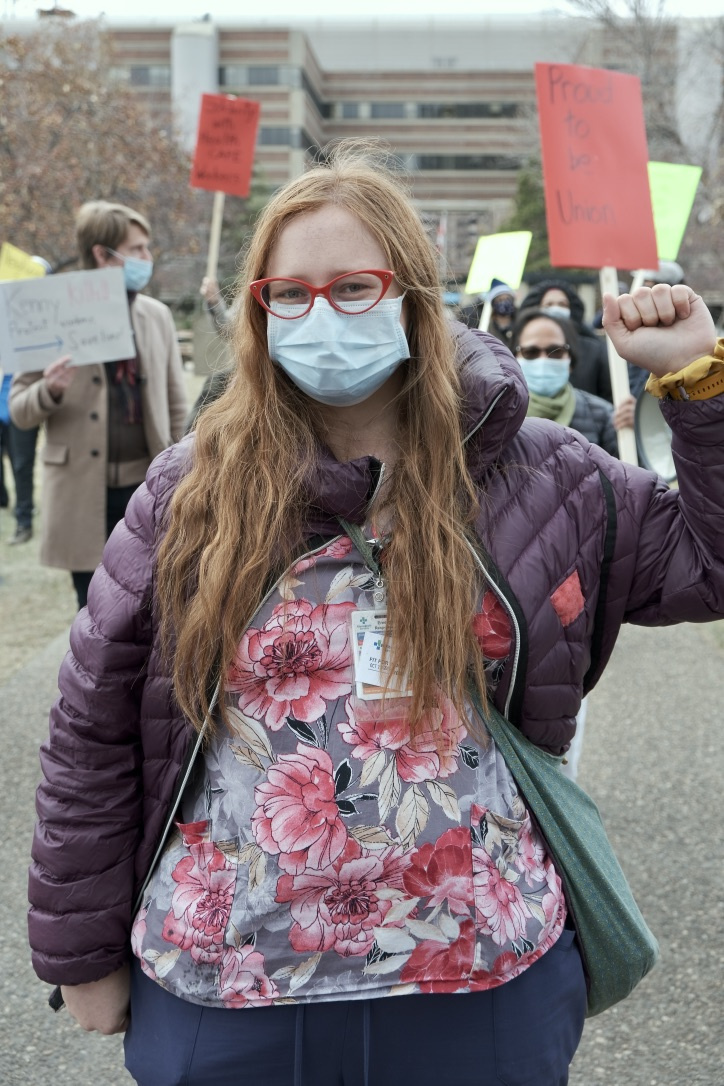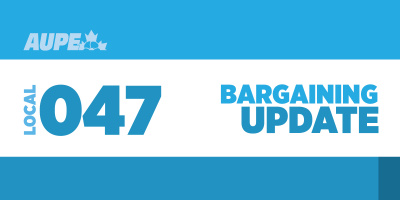By Alexander Delorme,
Communications staff
Alberta’s autumn cold spell ended by the morning of Monday, Oct. 26, 2020. The whole week was a forecast of highs above zero, a fair reprieve from the usual prairie cold and good news for trick-or-treaters, who for the most part could safely celebrate Hallowe’en despite the pandemic. It wasn’t just the kids who were happy; just about everyone was relieved that the ugly, imperfect storm of a worsening pandemic and a dark, lonely winter was out of mind, at least for the time being.
The province had no idea a very different kind of storm was approaching.
Before many Albertans got out of bed that morning, AUPE members across the province walked off the job to protest the UCP government’s cruel cuts to their jobs and Alberta’s public services, especially health care.
“The actions these brave members took that day made the whole country look at what the UCP government is doing to destroy health care in Alberta,” says Guy Smith, AUPE president.
AUPE vice-president Karen Weiers agrees: “They drew full attention to the UCP’s privatization and cuts and the fact that the government is doing all of this during a pandemic, behind closed doors, instead of helping Albertans.”
The pandemic also created obstacles to how unions, including AUPE, continue to stay connected with the membership.
“Not being able to hold worksite or community hall meetings with members, we knew that in order to get everyone prepared to fight back against the government’s aggressive attacks on jobs and services that we would have to reach out in new and different ways” says Weiers.

Tatiana McCallum is one of the AUPE members who jumped head-first into connecting with her fellow workers despite the pandemic. With a fiery spirit to match her red hair, she was on the phone for much of the year getting member feedback, telling them how to get involved in the union, and sharing all the latest news with her co-workers at the University of Alberta Hospital.
She even attended renowned U.S. labour organizer Jane McAlevey’s Organizing for Power Strike School. According to McCallum, several AUPE members and other Albertans joined activists around the world for this masterclass in solidarity organizing.
“It’s a personal matter to me,” says McCallum. “I feel like it’s my moral responsibility to help get people mobilized and engaged to protect our jobs and Alberta’s public services. I wish I had gotten involved earlier and am so happy I started organizing when I did. It’s been an incredible experience.”
They (AUPE members) drew full attention to the UCP’s privatization and cuts and the fact that the government is doing all of this during a pandemic, behind closed doors, instead of helping Albertans.
Weiers spent most of Oct. 26 driving through the south region of the province, racing to visit members who had joined the wildcat and sharing their stories with the local news.
AUPE members showed the province not only the power of a union, but also how their important work keeps Alberta going. They showed the power of standing in solidarity and demanding dignity for themselves and their fellow Albertans, and their fellow Albertans supported them. Polling after the wildcat showed Albertans supported the strike more than they supported Premier Jason Kenney or official opposition leader Rachel Notley.
“When our union was born 100 years ago, it was because the workers fought back against a government that treated them like servants,” says Weiers. “Whether it’s that fight 100 years ago, the laundry strike decades ago, or what the UCP is doing to us right now, there will always be a bully who tries to push Albertans around. So, we can never stop our fight. We have to stand up for what is right.”
Smith says: “Although the wildcat strike lasted only one day, it was an inspiring moment for many. It was a show of force from Alberta’s front-line workers who were tired of politicians and bosses publicly praising them while simultaneously stabbing them in the back. I am so proud of these members, of the stand they took and what they achieved.”
By the time of the wildcat, Albertans had just found out Kenney’s UCP government planned to send 11,000 health-care workers from the front line to the unemployment line. The wildcat was the workers’ loud and clear response to that proposition, and a sign Albertans weren’t going to take the UCP’s abuse without a fight.
The grim realities of the pandemic reduced our capacity for activism, caused grief and hardship for members and our families, and stopped our large worksite rallies. But we evolved. As the world adapted to living online, so too did our organizing efforts.
It was also a sign of all the hard work AUPE members had previously put into organizing their workplaces. Long before COVID-19 and government cuts were wreaking havoc across Alberta, AUPE members were flexing their muscles in preparation for the larger battles ahead.
“There were over a hundred rallies across Alberta,” says Weiers. “The rallies themselves weren’t organized by AUPE headquarters; they were actually organized by the members. The members at the worksites, towns, and cities, they were the ones who gathered the people and informed the people, and not just fellow AUPE members, but allies within their communities as well.”
COVID-19 put a stop to it all. While the province and most of the world locked down to prevent the spread of the virus, AUPE members shifted all their focus to providing front-line public services for Albertans. With the pandemic crashing down on us, Albertans relied on AUPE members more than ever.
Smith says: “The grim realities of the pandemic reduced our capacity for activism, caused grief and hardship for members and our families, and stopped our large worksite rallies. But we evolved. As the world adapted to living online, so too did our organizing efforts.”
Weiers adds: “Pandemic or not, it’s our responsibility to empower each other. Every AUPE member can help organize, even when they’re not together in person. It used to be that you showed up for a meeting and that was it, but now we’re using phone banks and virtual town halls to reach out to members. We’re mentoring each other. These grassroots members volunteer their time because they know it’s all about solidarity.”
As a unit clerk at the University of Alberta Hospital, McCallum has witnessed first-hand how the pandemic has affected patients and working conditions. If there were ever a time for the UCP government to support patients and front-line workers, this would be it, but they are continuing with their cruel privatization scheme and that’s what McCallum says needs to be struck down.
“I would say things were already at a breaking point before the pandemic,” she says. “But now the short-staffing, increased workloads, not enough funding, pressure to discharge people early, all these things have contributed to an explosion of stress and sickness and burnout.”
Thousands of AUPE members, whether they work in health care, government services, education, or municipalities, boards, and agencies, can relate to the conditions McCallum describes. The COVID curve hasn’t been bending itself – it’s been bending us. But we haven’t broken, far from it, and McCallum is confident AUPE members will organize and fight back with renewed strength in the new year.
“I don’t think people are resigned to it,” she says. “Hearing the government is going to cut your job … It can be hard to believe because it’s cruel, it’s grotesque, it’s unbelievable, but it’s true. It has members wondering what can we do? Ultimately, it has strengthened members’ resolve; it has become clear we have nothing to lose.”


